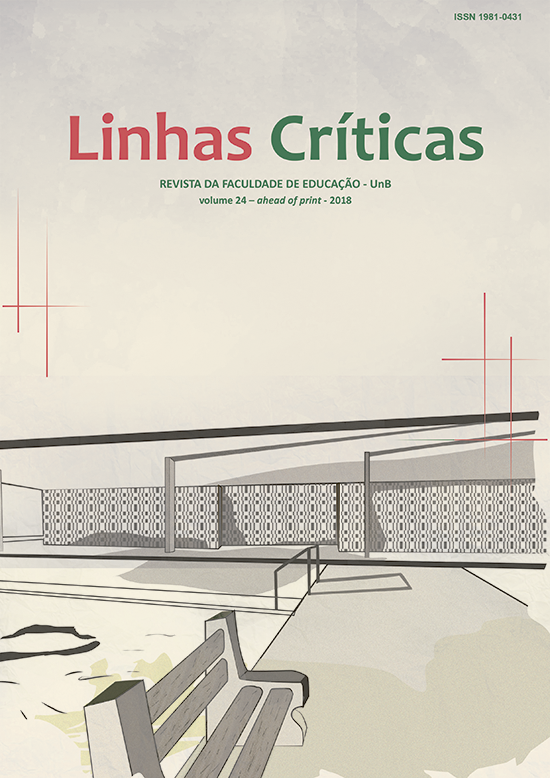Control and self-regulation of learning according to P. Ya. Galperin
DOI:
https://doi.org/10.26512/lc.v24i0.19721Keywords:
Content internalization, Learning, Galperin's TheoryAbstract
During the last decades, self-regulation of learning has been a relevant concern in educational research and considered a personality aspect related to the mechanisms of voluntary attention that the subjects devote to their actions. In the case of learning, self-regulation concerns the activity performed in order to learn. Thus, this article discusses the process of content internalization as a form of attention and mechanism of self-regulation in the school setting, based on the Theory of Planned Formation of Mental Actions and Concepts by P. Ya. Galperin, in the context of Developmental Didactics.
Downloads
References
Galperin, P. Ya., & Talizina, N. F. (1965). Control of the Learning Process is Basic. Russian Education and Society, 7(12), 19-24.
Galperin, P. Ya., Zaporózhets A., & Elkonin, D. (1987). Los problemas de la formación de conocimientos y capacidades en los escolares y los nuevos métodos de enseñanza en la escuela. In M. Shuare & V. Davidov (Orgs.). La psicologia evolutiva y pedagógica en la URSS. Moscú: Editorial Progreso.
Galperin, P. Ya. (1989). The Problem of Attention. Soviet Psychology, 27(3), 83-92.
Galperin, P. Ya. (1992). Stage-by-Stage Formation as a Method of Psychological Investigation. Journal of Russian and East European Psychology, 4(30), 60-80.
Galperin, P. Ya. (2001a). Sobre la formación de los conceptos y de las acciones mentales. In L. R. Quintanar (Org.). La formación de las funciones psicológicas durante el desarrollo del niño. Tlaxcala: Editora Universidad Autónoma de Tlaxcala.
Galperin, P. Ya. (2001b). Tipos de orientación y tipos de formación de acciones y de los conceptos. In L. R. Quintanar (Org.). La formación de las funciones psicológicas durante el desarrollo del niño. Tlaxcala: Editora Universidad Autónoma de Tlaxcala.
Galperin, P. Ya. (2001c). La investigación del desarrollo intelectual del niño. In L. R. Quintanar. La formación de las funciones psicológicas durante el desarrollo del niño. Tlaxcala: Editora Universidad Autónoma de Tlaxcala.
Galperin, P. Ya. (2001d). La direción del proceso de aprendizaje. In L. R. Quintanar. La formación de las funciones psicológicas durante el desarrollo del niño. Tlaxcala: Editora Universidad Autónoma de Tlaxcala.
Galperin, P. Ya. (2014). The Role of Orientation in Thought, Soviet Psychology, 18(2), 84-99.
Núñez, I. B. (2009). Vygotsky, Leontiev, Galperin: Formação de Conceitos e princípios didáticos. Brasília: Líber Livro.
Talízina, N. F. (1988). Psicologia de la Enseñanza. Moscú: Editorial Progreso.
Talízina, N. F. (2000). Manual de Psicologia Pedagógica. México: Universidade Autónoma de San Luis de Potosí.
Vigotsky, L. S. (1997). História del desarrollo de las funciones psíquicas superiores. La Habana: Editorial Científico Técnico.
Published
How to Cite
Issue
Section
License
Copyright (c) 2018 Revista Linhas Críticas

This work is licensed under a Creative Commons Attribution 4.0 International License.
Authors who publish in this journal agree to the following terms:
-Authors maintains the copyright and grants the journal the right of first publication, the work being simultaneously licensed under the Creative Commons Attribution License which allows the sharing of the work with recognition of the authorship of the work and initial publication in this journal.
- Authors are authorized to enter into additional contracts separately, for non-exclusive distribution of the version of the work published in this journal (eg publish in institutional repository or as a book chapter), with acknowledgment of authorship and initial publication in this journal.
-Authorers are allowed and encouraged to publish and distribute their work online (eg in institutional repositories or on their personal page) at any point before or during the editorial process, as this can generate productive changes as well as increase the impact and the citation of published work (See The Effect of Free Access).



